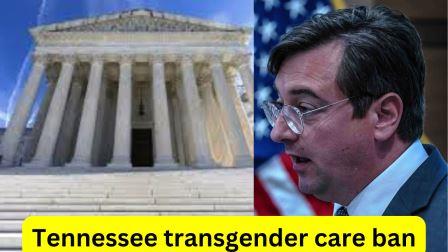The U.S. Supreme Court is set to hear arguments in a pivotal case concerning transgender rights and the legality of Tennessee’s ban on gender-affirming care for minors. The case, which has drawn national attention, addresses whether the state’s law violates the Constitution’s promise of equal protection under the 14th Amendment. This decision could have sweeping implications, not only for Tennessee but for 24 other states with similar policies.
Understanding Tennessee’s Ban on Gender-Affirming Care
In 2023, Tennessee enacted legislation prohibiting medical treatments such as puberty blockers and hormone therapies for minors experiencing gender dysphoria—a condition characterized by significant distress resulting from a mismatch between an individual’s gender identity and their sex assigned at birth. Proponents of the law argue it is designed to protect minors from “life-altering and risky procedures.” The law permits these treatments for other conditions, such as congenital defects and precocious puberty, but bars their use for gender-transition purposes.
Healthcare providers who violate the law face lawsuits, fines, and potential professional discipline. Tennessee’s Attorney General Jonathan Skrmetti defended the law, stating it aims to prevent irreversible harm to children amid “scientific uncertainty.”
Challenging the Ban: Advocates for Transgender Rights
Opponents of the law, including families, healthcare providers, and the Biden administration, argue that it discriminates based on sex and transgender status. The plaintiffs include Brian Williams and his 16-year-old transgender daughter, L.W., who rely on gender-affirming care for her well-being. Williams emphasized the profound impact such care has on his daughter’s happiness and confidence, urging the court to protect her freedom to live authentically.
Medical associations like the American Medical Association and the American Psychiatric Association strongly support gender-affirming care, citing its role in reducing the risks of depression and suicide among transgender youth. Long-term studies have shown these treatments to be effective and life-saving for many.
Key Legal Issues: Equal Protection and Scrutiny Levels
The Supreme Court will determine whether Tennessee’s law violates the equal protection clause of the 14th Amendment. The challengers argue that the law discriminates against transgender minors by restricting access to treatments based on their sex and gender identity. Solicitor General Elizabeth Prelogar, representing the Biden administration, contends that withholding treatments based on gender identity constitutes sex discrimination.
A central debate in the case revolves around the level of scrutiny the court should apply. Under rational basis review—the lowest level of scrutiny—laws are generally upheld if deemed rational. The Sixth Circuit Court of Appeals applied this standard, ruling in favor of Tennessee. However, the challengers advocate for heightened scrutiny, which is typically applied in cases involving sex discrimination. This standard requires the state to demonstrate that the law serves an important governmental objective and is narrowly tailored to achieve that goal.
Previous Supreme Court Rulings on Transgender Rights
This case marks only the second major transgender rights case to reach the Supreme Court. In 2020, the court ruled in Bostock v. Clayton County that Title VII of the Civil Rights Act protects employees from discrimination based on sexual orientation and gender identity. Advocates hope the court will apply similar reasoning in this case, acknowledging that “sex plays an unmistakable role” in the treatment of transgender individuals.
However, Tennessee cites the court’s recent Dobbs v. Jackson Women’s Health Organization decision, which returned the issue of abortion to states, as a precedent for upholding state authority in regulating medical procedures.
Implications for Transgender Rights Nationwide
The outcome of this case could set a precedent affecting transgender rights across the country. A ruling in favor of Tennessee could embolden states to enact more restrictive laws targeting transgender individuals, while a decision against the ban could strengthen legal protections for transgender youth.
The case also highlights the broader cultural and political battles over transgender rights. Former President Donald Trump and his allies have pledged to roll back protections for transgender people, further intensifying the debate.
Historic Moment: First Openly Transgender Attorney to Argue Before Supreme Court
Chase Strangio, a lawyer for the American Civil Liberties Union (ACLU), will make history as the first openly transgender attorney to argue before the Supreme Court. Representing the families and healthcare providers challenging Tennessee’s law, Strangio is advocating for the rights of transgender youth to access medically necessary care without discrimination.
What Lies Ahead?
The Supreme Court’s decision, expected by June, will have far-reaching consequences for transgender rights, healthcare access, and state authority in regulating medical treatments. With its conservative majority, the court’s ruling will be closely watched by advocates and opponents alike.
As this landmark case unfolds, it underscores the ongoing struggle for equality and the critical role of the judiciary in shaping the rights of marginalized communities in the United States.

1 thought on “U.S. Supreme Court to Decide on Tennessee’s Ban on Gender-Affirming Care for Minors”